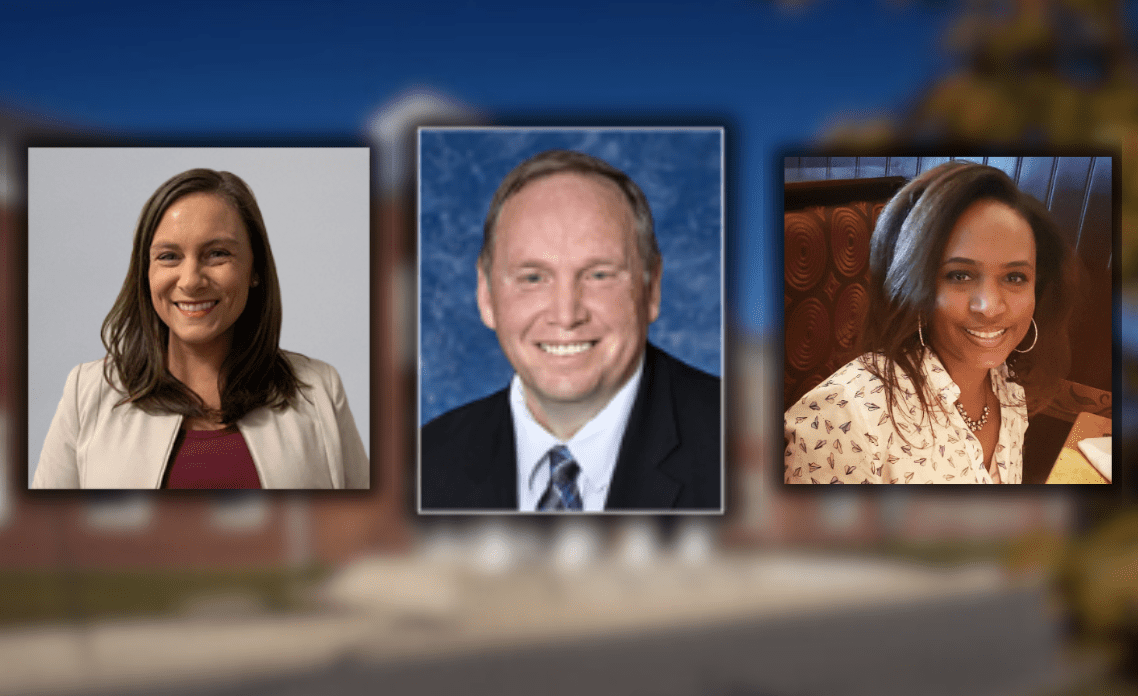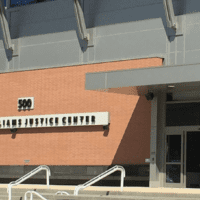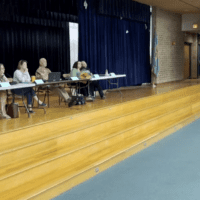

Three of four of Appo’s candidates participated in Tuesday night’s Q+A. (From left: Britney Mumford, Norm Abrams, Candace Jusino)
Another night of get-to-know school board candidate forums, another missing participant.
The trend of office-hopefuls not showing up to public meetings continues, as just three of the four of Appoquinimink School District’s school board candidates for this year’s election attended Tuesday night’s meeting.
In the second installment of a four-district virtual series, candidate Timothy Johns declined to participate in the session, hosted by several education and social advocacy groups like First State Action Fund, Delaware PTA, the League of Women Voters, NAACP Central Delaware and others.
Monday night, just one candidate showed for the Christina School District’s forum.
All of the meetings – which aren’t a dialogue, but a question and answer – ask the candidates to share their positions on education issues like student achievement, the role of board members, support for minority students, school safety, parental engagement and other topics heavily discussed in the sphere of public education in Delaware.
Four people are vying for a single seat in Appo, which just had its referendum pass just hours after Tuesday’s forum.
Here’s some viewpoints from the three candidates that showed:
Role of school board members
Outside of the listed job duties of a school board member, like setting policy, guiding curriculum and hiring or firing the superintendent, the three candidates expanded on what their perspective on a board member is.
Candace Jusino was the first to speak, and she said it’s tough being a mom, it’s tough being a parent, it’s tough being a student.
“So as a school board member, I’d make sure that I every time I made a policy decision, when it comes to our education, our goals, I would keep in mind our students and our parents so that it’s something that’s accessible to them,” she said, “and if we do need to make goals toward improving our reading, which we do, and our math, that we do it in a way that parents can access it, that they can understand it and they have support.”
She said evaluating the superintendent is also crucial.
Britney Mumford, executive director of DelawareCAN, said the role of a school board member differs a little bit from a superintendent or the administration.
“The board really sets that overall direction and policies while it’s the job of the superintendent and the administration to implement policies, manage day to day operations and really oversee the administrative functions of the schools,” she said.
The open seat’s incumbent for 15 years, Norm Abrams, said board members do not get involved with building administration or principals, as that is the job of the superintendent.
“One of the most difficult things about being a school board member I’ve learned over the 15 years is the ability to listen and understand what everybody’s telling you,” he said. “You can have a first answer pop into your head which you think is the right answer. Then you have to listen to everybody speaking on the subject, and then you have to make a decision about that.”
It’s important to have the ability to be flexible and have a change of mind, he said.
Low proficiency scores
- Mumford believes the school board members can have a direct impact on test scores.
While Appo already has a curriculum aligned with the science of reading – a method of using phonics and other components to teach students how to read and sound out words rather than memorizing them – Mumford said the district must do a better job at training teachers how to teach this.
“Without professional development, we will not see success,” she said, adding that the district should allocate funds towards more tutoring services.
- Abrams said it’s the district’s job to ensure that every student can read and write.
“The state sets the standards, and then they do change rules on how to get there,” he said.
The district takes professional development seriously, and achievement metrics have been hurt since the pandemic, he said.
- Jusino said the district should focus on its successes.
“I do know that we have some students in our district who are very high-performing whose parents are very motivated and families are very motivated to help them,” she said. “What we do is we take the students who are successful, and we partner kids that are not as doing as well on a certain subject, every student has their ability to do better in some way.”
One student might be better at science while the other is better at social studies, and students should feed off of the achievement of one another through collaboration.
Implicit bias and diverse students
- Abrams said the ultimate goal is to eliminate all bias in the district, but it exists everywhere.
“I mean, just ask yourself when you’re driving your car down the road, you see somebody with a can asking for coins, what’s the first thought that comes to your mind?” he said.
In the realm of education, he said it’s most important to take that bias away when making policies, and everyone should feel comfortable and safe.
An intellectually diverse community is the goal, he said, and diversity should be explored and not ignored.
- Jusino said implicit bias exists not only in education, but racism is ingrained in the past of the state and country.
“Human beings, how we’re built, we come with biases,” she said. “I think besides the racial ones, I think our brain needs to make quick decisions all day long.”
She said coming from a place of defensiveness is not helpful, and the district needs to first look at data and understand where it is in terms of treating certain students differently.
Bilingual educators should be a priority for students transitioning into learning English, she said, especially because young English language learners can experience a high level of stress and anxiety in a new environment.
- Mumford thinks training staff to be aware and address implicit bias is needed.
She said the district needs to celebrate diverse backgrounds and cultures and encourage discussion to help bring the community together.
Opportunity funding – block grants from the state for low-income students, students with disabilities and English language learners – need to be properly allocated, she said.
“We need funding that is specific to resources that our students need, and that treats our students like individuals with unique needs and not just line items in a budget,” she said.
School discipline
- Mumford said the district needs to focus on conflict-resolution to ensure that repercussions fit what was done and that Appo is not being punitive and is actually trying to fix the problem.
Students should not be removed from an educational environment at all costs, she said.
“Sometimes it’s that simple talking to our students and figuring out what the underlying causes or what’s wrong can really lead to a world of difference,” she said, “rather than simply punishing a student or sending them out of the classroom.”
Still, she said she does respect that in some cases, disruptions are making it more difficult for other students to learn.
School resource officers must create a positive climate as well, she said, and be trained in de-escalation techniques.
- Abrams said while every school has a code of conduct, sometimes it’s not as simple as “if you do x, that equals y punishment.”
Avoiding disruptions and keeping students in the classroom is his goal, and restorative justice to dive a little deeper into what the problems in the classroom are is important.
He said school resource officers need to connect and get to know the students they serve – students should not feel threatened by them.
- Jusino said sometimes it really boils down to creating a culture for a school where all students truly feel they deserve to be there.
“Kids who are being disciplined, or having trouble in school shouldn’t just be sent away or treated as they’re the only problem there,” she said. “There usually is a reason behind it, whether it be they are hungry, maybe something is happening at home.”
She said that the school-to-prison pipeline has its roots in early education, so getting preschoolers and kindergartners off to the right foot, both in school but also in a healthy home environment, is paramount.
Guns
- Jusino prioritized gun safety and educating parents on how to store firearms in a safe manner.
She acknowledged the gun violence going on in Delaware, as well as several gun-related incidents in schools over the past couple years, and said there needs to be more attention on how the pandemic affected students and their mental health.
Connecting struggling students to community resources and wraparound services to keep them active and engaged is one way to get those bad feelings out and prevent violence, she said.
- Mumford strongly supports common sense gun laws and safe storage practices.
Those play a huge role in preventing gun violence, particularly near schools, she said.
“We need to enact legislation to ensure responsible gun ownership, universal background checks, closing loopholes in our current law,” she said, “and really teaching students and adults about implementation of safe storage requirements to prevent unauthorized access to firearms, especially by children.”
She said guns should not be in schools and teachers should not be armed.
- Abrams agreed with both, and highlighted the need for common sense gun laws.
Guns have no place in a school setting, he said, and the state should close every loophole that’s out there.
Book-banning
- Mumford believes in upholding academic freedom, intellectual diversity and freedom of expression.
“Banning books really undermines these principles,” she said, “and it restricts access to diverse perspectives and ideas, things that lead to critical thinking and intellectual growth.”
As a board member, she would make all decisions around instructional materials through a transparent, inclusive and democratic process where parents’ voices are heard.
Students need to have a diverse set of viewpoints and experiences to learn about, she said, but definitely at an age-appropriate level.
- Abrams, whose wife is a librarian, agreed that books should not be banned.
“The only thing I’d like to add in that is the policy of our school district is a parent has the ability to view or channel whatever they want their students to see at the beginning of the year they can they can lay out exactly what they want their student to see or not see at all,” he said.
- Jusino said curiosity fuels the natural desire to learn and read and books should not be banned.
While books must be age appropriate, she said if the district closes off different viewpoints and diversity of thought, students can’t learn critical learning skills and media literacy to understand fact from opinion.
LGBTQ+ students
- All students should be protected and have a safe learning environment, Abrams said.
“They should also feel the ability to express themselves as they wish to be expressed,” he said.
He said it “gets a little tricky” when considering high school and sports, but he reaffirmed that students should be who they want to be in school, and he will support them no matter what.
- Jusino said if these students cannot feel safe at school, then there’s no way they can achieve their academic goals.
This is a time where students are exploring themselves, and whether it’s race, gender or sexuality, they need to be accepted and not discriminated against.
“Any student that we can support to be their truest self and find their fullest potential, I’m totally supporting that,” she said.
- Mumford wants to create an inclusive and supportive environment for all LGBTQ+ students.
“We need to have policies that protect the rights and well being of these students to ensure that they feel safe and respected and particularly valued within our schools,” she said. “The school’s role is really to just foster a culture of acceptance and diversity.”
Regardless of sexual orientation of gender identity, a student will feel detached and will flee socially and emotionally if they don’t feel accepted.
Mental health
- Mumford wants to see strong mental health supports and staff members in Delaware’s schools.
She thinks schools are currently doing a pretty good job at this, and it’s important to recognize that this plays a huge role in academic and social success as a student develops.
Integrating social emotional learning into all aspects of a school day is important, she said.
- Abrams also stressed the need for social emotional learning.
“What I think we’re falling short at is more funding needs to be geared towards it,” he said. “I think we have to put more resources into it from the beginning, especially when we come out of COVID.”
He thinks these efforts could help combat disciplinary problems going on in school districts.
- Jusino pointed out there’s been a sharp uptick in the number of students who have depression or anxiety.
More mental health support is needed, she said, and connecting with community organizations who specialize in mental health services would be a great move.
She suggested even having workshops with parents to equip them with the tools to help their children through their mental health struggles.
School choice and charters
- Mumford thinks school choice is a valuable part of the foundation of Delaware schools.
“We know, and I think COVID taught us this lesson, but we’ve known for a long time that not every student learns the same way and expecting them to do so does not set them up for success,” she said.
Providing alternative options for families is a good thing, she said, and charter schools add to the richness of First State education.
But, she said district and charter schools need to play by the same rules.
“Our charters have to defend their existence every five years [through the renewal process],” she said. “I would love it if our district schools were held accountable in the same way.”
- Abrams said he’s not a big fan of charter schools for many reasons.
He said he does believe in school choice and thinks it’s valuable, but doesn’t believe charters play by the same rules.
“Charter schools, if they’re done right, that’s fine, but the thing about charter schools is they can pick who they want, while in public education, you can’t, and the doors open and we take everybody that comes in,” he said.
In his closing remarks, he clarified his statement.
“I’m not against parents having the choice to send their children wherever they think is best for them and their students,” he said. “I just wish it was a level playing field.”
Charter schools seem to take the most selective students, he said, and then boast on their statistics.
- Jusino is a fan of charter schools and school choice, and said this has been helpful to her as a mom trying to pick the right schools for her children.
Children learn differently, she said, and if students are more interested in or want to explore one element of education more, school choice allows them to pick a school that fits those interests.
“Having these choices now are critical for families, especially if you can’t afford privates and you want that choice,” she said.
Here are the remaining school board candidate forums:
- Red Clay Consolidated School District: Tuesday, April 30 from 6 p.m. to 7 p.m.
- Colonial School District: Wednesday, May 1 from 6 p.m. to 7 p.m.
Register for the meetings here.


Raised in Doylestown, Pennsylvania, Jarek earned a B.A. in journalism and a B.A. in political science from Temple University in 2021. After running CNN’s Michael Smerconish’s YouTube channel, Jarek became a reporter for the Bucks County Herald before joining Delaware LIVE News.
Jarek can be reached by email at [email protected] or by phone at (215) 450-9982. Follow him on Twitter @jarekrutz and on LinkedIn
Share this Post







